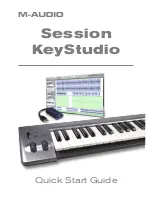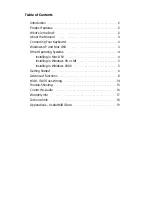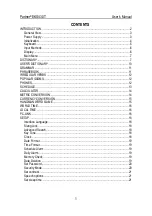
1
SWITCHING ON/OFF
To switch on the instrument move selector
c
to ON. To
switch the instrument off move the same selector to
OFF. The keyboard switches off automatically after 3
minutes of non-use.
DEMOSONGS
This keyboard has 6 demosongs. Press Demo Select
g
to listen to the six demosongs in sequence.
Press Stop
f
to interrupt.
VOLUME CONTROL
Adjust volume to desired level by using the VOLUME
buttons
a
; (+) to increase and (–) to reduce.
SOUNDS
You can select the sounds (Piano, Organ, Violin, Music
box) by pressing the related button
e
.
RHYTHMS
You can select the rhythms (Blues, Rock, Samba, Waltz)
by pressing the related buttons
d
. Press the Tempo
buttons
h
to reduce (–) or increase (+) the rhythm
speed.
Press Stop
f
to interrupt.
PADS
By pressing the button Animal/Drum
b
you can
alternatively utilize the 4 pads
i
either to play
percussion instruments (Drum) or to reproduce the
animal voices (Animal).
MICROPHONE
Insert microphone in the special holder and connect into
the socket
j
.
MUSICAL NOTES INDICATORS
On the front of the instrument, there is a coloured label
with indication of numbers next to each button in order
to facilitate the recognition of musical notes according
to the BONTEMPI method.
There are some songs written with the Bontempi method
on the back of the box, while others can be downloaded
from the website www.bontempi.com
POWER SUPPLY
Use a screwdriver to
open the battery
compartment. Insert 3 x
1.5 V batteries R6/AA
(not supplied), ensuring
correct polarity. Re-fit
battery cover. Replace
batteries when the quality of sound becomes bad.
Use
alkaline batteries to obtain a longer duration
.
ATTENTION - BATTERY CARE:
Non-rechargeable batteries are NOT to be recharged. • Rechargeable
batteries must be removed from the product before being charged. •
Rechargeable batteries are only to be charged under adult supervision. •
Different types of batteries or new and old batteries are not to be mixed.
• Use only batteries of the same or equivalent type. • Batteries are to be
inserted with correct polarity. • Remove exhausted batteries to prevent
leakage. • Do not short circuit supply terminals. • Remove batteries
during long periods of non-use.
WASTE DISPOSAL STANDARDS
For information regarding the disposal of the items mentioned here
below, please refer to Council Administration office regarding specialised
waste collection centres.
1. DISPOSAL OF BATTERIES: Protect the environment
by disposing of batteries in the special containers
provided for this use.
2. PACKAGING DISPOSAL: Take the paper, cardboard and corrugated
board to the appropriate waste collection centres. Plastic material must
be placed in the relevant collection containers.
The symbols indicating the various types of plastic are:
Key for the different types of plastic materials:
PET
= Polyethylene terephtalate •
PE
= Polyethylene, code 02 for PE-HD,
04 for PE-LD •
PVC
=Polyvinyl chloride •
PP
= Polypropylene •
PS
=
Polystyrene, Polystyrene foam •
O
= Other polymers (ABS, Laminates,
etc.)
3. DISPOSING OF ELECTRICAL APPLIANCES: The wheelie bin
symbol with a cross indicates that the product must not be
disposed of in the domestic waste at the end of its useful
life. Instead, it should be taken to your nearest designated
collection point or recycling facility. Alternatively, check
with your retailer and return the product when buying a replacement, on
a one-to-one basis or as free of charge in case the size is smaller than 25
cm. Appropriate disposal promotes the recycling of parts and materials,
as well as helping to protect the environment and human health. Under
current legislation, strict penalties are enforced against those disposing
of products illegally. For more information about the collection of special
waste, contact your Local Authority.
E N G L I S H
01
PET
02
PE
03
PVC
05
PP
06
PS
07
O
R6/AA 1.5V
R6/AA 1.5V
R6/AA 1.5V
R6/AA 1.5V
R6/AA 1.5V
R6/AA 1.5V
Summary of Contents for 047663308272
Page 17: ...15...




































